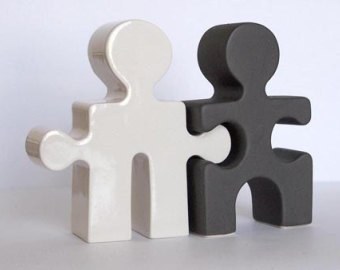The Best Way To Save Your Relationship
Most people believe that the best way to save their relationship is by communicating better or changing their partner. While these are nice when they happen, the problem is they hinge on both people working together. Alternatively, one way to positively impact your relationship is to focus on growing yourself so you can learn to be a better partner.
In an attempt to simplify this seemingly overwhelming task, consider these four concepts Dr. David Schnarsh calls the four points of balance leading to more successful interpersonal relationships.
Solid-flexible self:
a person’s ability to be clear about what they value, and who they are, while in close proximity to others who are important to them.
Having a solid flexible self means not having to put a physical or emotional distance between yourself and someone else because they have different beliefs than you do. A person with a solid-flexible sense of self can be influenced by others but does not compromise their own sense of self. They have a clear picture of themselves and are willing to share this with others in a way that allows others to know them more deeply. This person can entertain the thoughts and values of others without losing their own identity.
Quiet mind-calm heart:
a person’s ability to self-sooth.
Having a quiet mind and calm heart encompasses regulating your own emotions, feelings, and anxieties instead of allowing yourself to be comforted or controlled by others. A quiet mind and calm heart are key for the struggle for individual autonomy. If a person is not able to self-sooth, they are not capable of functioning alone. In time, they become dependent on their partner leading to a reactive desire for autonomy and ultimately less intimacy. As one learns to self-regulate and self-soothe one also learns how to be closer to those they care about. For more on how to do this, see what Dr. Amy Fuller has to say about using a green light practice.
Grounded Responding:
a person’s ability to stay calm and assertive when their partner gets anxious.
This means accepting your partner’s strengths and quirks without trying to change your partner to make yourself less anxious. Ultimately, this is tolerating a partner’s differences while staying close to them. When you respond instead of reacting you are addressing and not avoiding what is happening in the relationship with adult language and behavior.
Meaningful Endurance:
a person’s ability to deal with discomfort knowing it may produce growth.
Meaningful endurance is about facing your issues and working towards resolution within relationships instead of avoiding challenges or giving up. When we have meaningful endurance, we keep trying even though we are not sure we will find success and even if it doesn’t feel good. This ability to tolerate pain for growth is key to attaining long-term goals.
Putting it together
All of these concepts are related and build on each other. As you master one skill and move on to the next, areas of weakness will emerge. Focus on the weak areas as a challenge to grow personally and observe the impact these practices have on the relationship.
When put into practice, these four concepts of personal growth create the possibility of a more satisfying relationship without focusing on your partner’s flaws or other things outside of your control. For more information check the Crucible Therapy website or pick up a copy of Dr. David Schnarch’s book Intimacy & Desire.
Learning to grow as a person is always challenging. Finding a good therapist to walk with you in this journey can be very helpful. If you are in the Houston area, Fuller Life Family Therapy has therapists dedicated to models of personal growth.
Stay tuned,









